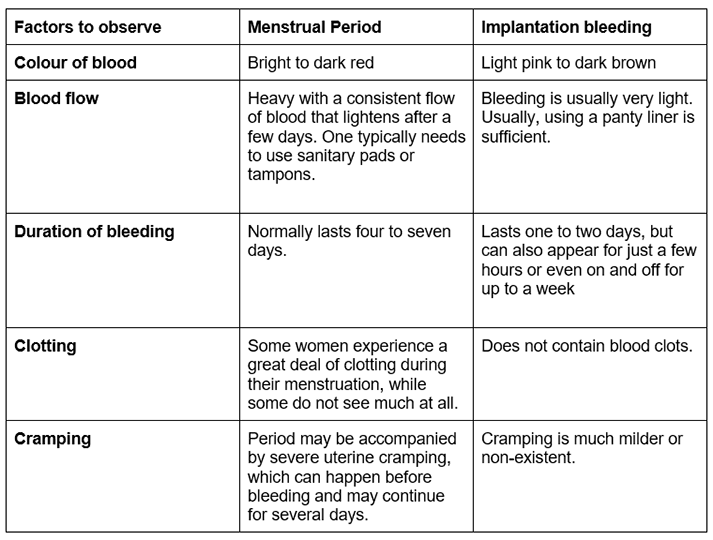Vaginal spotting doesn’t always signal a period. In fact, it could be an early sign of pregnancy.

If you’re hoping to conceive, it can be very disheartening to experience your period month after month. After all, a missed period is one of the first signs of pregnancy, and is something one can look forward to.
However, some bleeding doesn’t always mean your period is here. It could in fact be implantation bleeding, which does in fact indicate that you’re pregnant. We answer your burning questions about implantation bleeding, including signs, symptoms, how it differs from a normal period and what to do if you experience it.
What is implantation bleeding?
Implantation bleeding is an early sign of pregnancy, occurring when a fertilized egg (embryo) implants into the wall of the uterus. It can cause light bleeding that lasts up to two days, and is nothing to be alarmed about. In fact, it’s considered a normal part of pregnancy. About 25% of pregnant women will experience implantation bleeding
As the fertilized egg embeds itself into the uterine wall to grow, it can rupture a small amount of blood vessels in the lining. This causes light bleeding to occur, usually in the form of a light pink or dark brown discharge.
What are the key signs and symptoms of implantation bleeding?
As implantation bleeding usually occurs near the time of one’s next period, many women are confused whether it could be a possible pregnancy or a period.
Besides vaginal spotting, here are other signs of implantation bleeding to note:
- Light or faint cramping (less painful compared to normal period cramps)
- Mood swings
- Headaches
- Nausea
- Gastric bloatedness or discomfort
- Breast tenderness
- Lower backaches
- Heightened sensitivity to smell
However, it’s important to note that some of these may also be PMS symptoms or ovulation symptoms. As such, these along with pinkish/brownish spotting does not guarantee that you are pregnant.
And while it’s perfectly normal to experience implantation bleeding, not every woman does. You could also be pregnant even if you don’t experience this.
How to tell the difference between implantation bleeding and a normal period?
Five key factors to observe are: How heavy the flow is, the colour of the blood, clotting, the duration of the bleeding and the severity of the cramping.

When should I be worried about vaginal spotting or bleeding?
There are many possible causes for vaginal spotting or bleeding, before and during pregnancy. Any unexplained bleeding or abdominal cramping is worth a visit to your doctor, also if you experience other accompanying symptoms, which indicate a more serious issue.
For example:
- Dizziness
- Weakness
- Persistent bleeding
- Pain
- Fever
Your doctor will determine the cause of your symptoms, and evaluate whether treatment is necessary.
Can I test positive for pregnancy during implantation bleeding?
A urine test usually picks up pregnancy from five weeks of gestation. It’s also important to do the test after your regular period is due, and not immediately after you notice the light spotting. Even if it is implantation bleeding, a pregnancy test may still show up as negative if there isn’t enough time for hCG (pregnancy hormone) levels to be detected in the blood. hCG is a hormone produced during pregnancy.
For more clarity and certainty, get a blood test for hCG levels. This test can pick up pregnancy from about one week after ovulation.

When might implantation bleeding usually occur?
Here’s a general time of ovulation, fertilization and implantation based on a regular 28-day cycle. Note that cycle durations vary from one woman to another, so it shouldn’t be used as a definitive guide.
Day 1: First day of menstrual period.
Day 14: Ovulation occurs 14 days before your next menstruation.
Days 14 to 15: Fertilization occurs 0 to 1 day after ovulation (typically within hours of ovulation).
Days 20 to 24: Implantation happens about 6 to 7 days after fertilization, and implantation bleeding may occur for a few days.
If you’re experiencing vaginal spotting and bleeding and suspect you are pregnant, consider consulting a doctor specialising in women’s health. Thomson Women’s Clinics offer a comprehensive range of women’s healthcare services, with experienced Obstetrics and Gynaecology (O&G) specialists and several clinics located island-wide.
Photos: iStock
Like us on Facebook and check SmartParents regularly for the latest reads!
Other top reads…
EXPERT ADVICE: Should I be worried if I get very heavy periods?